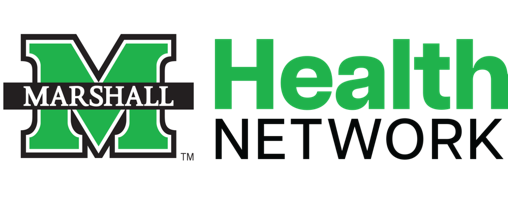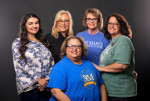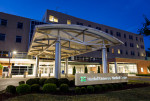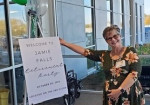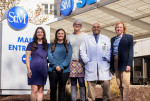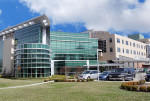Mountain Health hospitals return to restricted visitation
Wednesday, January 27, 2021
As part of its commitment to the health care of the community, as well as the safety of patients and employees, Mountain Health Network (MHN) is returning to its restricted visitation policies for both Cabell Huntington Hospital (CHH) and St. Mary’s Medical Center (SMMC) in response to reduced community spread of Coronavirus Disease 2019 (COVID-19), effective Friday, Jan. 29 at noon.
“We truly appreciate the community’s cooperation these past few months as we have not allowed visitors inside our hospitals,” said Hoyt Burdick, MD, chief medical officer, MHN. “With the reduction in community spread, we are pleased to be able to once again allow visitation on a restricted basis, for the benefit of our patients, their loved ones and our hospital staff.”
The guidelines for adult inpatient and ICU visitation at both CHH and SMMC are now as follows:
- Adult inpatients who are admitted to a Mountain Health facility may have only one visitor in the building each day during the hours of Noon-6 p.m. and during discharge instructions. Patients cannot switch visitors during the day.
- The visitor may only leave the patient room to go to the cafeteria OR to meet food delivery personnel in the lobby. Once a visitor exits the building, they will not be allowed to return until the next day.
- No visitors for patients in isolation for suspected or confirmed COVID-19.
General visitation guidelines at both CHH and SMMC are:
- All visitors should arrive wearing a mask and continue to wear their mask during their entire stay. Visitors must provide their own mask.
- Visitors will be screened at the entrance using a brief series of questions.
- All visitors should wash their hands with soap and water for 20 seconds or apply hand sanitizer upon entry and departure from patient rooms and the facility.
- Visitors must be age 18 or older.
- Compassionate care considerations and exceptions may be made on a case-by-case basis.
- Exceptions to visitation hours may be made for essential caregivers.
Pediatrics, Pediatric Intensive Care Unit & Neonatal Intensive Care Unit Visitation
- Pediatric, PICU and NICU patients who are admitted to Hoops Family Children’s Hospital (HFCH) will be allowed up to two essential caregivers (parents or guardians only) who visit their pediatric patient during their stay.
- Patients may have only one of these designated visitors in the building at a time.
- The visitor may only leave the patient room to go to the cafeteria OR to meet food delivery personnel in the lobby.
Labor & Delivery and Mother Baby Unit Visitation
- Labor & Delivery and post-partum patients who are admitted to a Mountain Health facility may have one designated support person in labor, delivery, and for the duration of the mother’s hospital stay.
- All pregnant women coming for ultrasounds at a MHN facility will be allowed to have one person accompany them to the appointment. This person must be age 18 or older, wear a mask/face covering, be asymptomatic, and wash or sanitize their hands.
Emergency Department Visitation
- Emergency Department patients at a Mountain Health facility may have one person accompany them into the facility/room who must remain in the room with the patient during their ER visit.
- All other visitors must remain in their vehicles.
Inpatient & Outpatient Surgeries and Procedures Visitation
- Adult patients having an outpatient procedure or surgery at a Mountain Health facility may have one designated person accompany them to the facility.
- This designated person will be asked to wait in their vehicle during the procedure and will be contacted by the staff throughout the procedure with updates as well as discharge instructions once the procedure is finished.
- Visitors of adult inpatients taken to surgery will be asked to wait in the patient room during the procedure.
- Pediatric patients having a procedure or surgery at a Mountain Health facility may have one parent/guardian accompany them into the facility and remain with patient until the procedure. During the procedure, this parent/guardian may wait in the lobby.
Physician Offices and Clinics Visitation
- Patients at physician offices and clinics may be asked to wait in their vehicles or outside the office until their appointment. Contact your provider’s office/clinic for information prior to your appointment.
- Family members of adult patients will not be allowed to accompany their loved ones into the office or exam room unless absolutely necessary. If an essential caregiver is needed for assistance, only one person may accompany the patient.
- Pediatric patients may have one parent or guardian present during the appointment who remains in the exam room with them.
- Patients arriving to receive and discuss critical results with their provider may be accompanied by one visitor to their appointment.
Clergy Visitation
- Spiritual ministry for COVID-19 positive or isolated patients is through electronic communications only – not at bedside.
- Outside clergy intending to visit with a patient admitted to a Mountain Health facility should contact, and coordinate with, the respective facility’s pastoral/spiritual care department.
- Mountain Health pastoral care will provide education to visiting clergy on safe ministry and visitation practices.
The skilled nursing and behavioral health units at SMMC are closed to visitors.
MHN will reassess its policy on a weekly basis and will make adjustments as community spread allows. MHN officials encourage the community to follow the guidelines set forth by the Centers for Disease Control (CDC) to prevent the spread of COVID-19:
- Wash your hands often.
- Avoid close contact (less than 6 ft. apart).
- Cover your mouth and nose with a mask when around others.
- Cover coughs and sneezes.
- Clean and disinfect.
- Monitor your health daily.
“It is through the cooperation and hard work of our community in following the CDC guidelines to reduce the spread of COVID-19 that we are able to once again offer this important component of patient care,” Dr. Burdick said. “We ask for the community’s continued cooperation as we work together to keep our patients, visitors and employees safe.”
